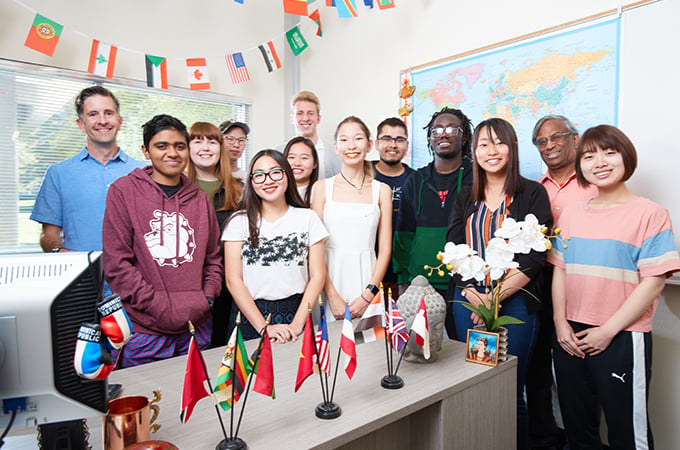Professor Steve Wuhs, associate provost for internationalization, offered the following remarks at the recent Diversity Town Hall on how the University of Redlands is supporting international students and students with Deferred Action for Childhood Arrivals (DACA) status in a difficult external environment.
I joined the University in 2003 as a professor of Latin American politics, but for the past five years I’ve worked as the associate provost for internationalization, the University’s lead international officer. One important role I have in that capacity is the “principal designated school official”—that’s the interface between University of Redlands, ICE [U.S. Immigration and Customs Enforcement], and the Department of Homeland Security that allows us to have international students on our campuses.
Presently, we have about 120 international students enrolled at our main Redlands campus, the other Southern California campuses, and our Marin campus. They are about evenly divided between our graduate and undergraduate programs, study in lots of different programs of study, and are a wonderfully diverse group of students in terms of their national origins.
The external environment for the past three years has been hostile for our international students, and in the Office of International Students and Scholars (OISS) we offered support and advocacy for our international students as well as a space in which they could organize and act as a group. The success of those efforts has depended on collaboration among the team members in OISS, but also work with our enrollment offices, Student Affairs, the Registrar’s Office, and the academic deans’ offices. It has also depended on the revitalization of the Redlands International Student Association (RISA), a mostly undergraduate organization that gives our students space to identify common problems and develop strategies to tackle them, as well as a space for recognizing and appreciating cultural diversity. Because our student population is so diverse, RISA is able to collaborate with other student organizations with whom RISA members share identities—Pride, DEFIANT, and the Black Student Union, for example.
The pandemic has created a challenging time for our international students. First, they had to disperse rapidly from campus—like our U.S. domestic students, but with longer trips, bigger logistical challenges, and sometimes less welcoming landing spots. Some ended up in military quarantine camps in their home countries, trying to wrap up the spring 2020 semester. Others even now are with aunts, uncles, siblings, or family friends across the U.S. because of the challenges of going home to their families.
In the midst of that, as universities like ours were shifting online, new regulations were issued in July (and then rescinded) by ICE that placed their ability to continue their educations at risk. Through phone calls, emails, and weekly community calls, we are working to continue supporting these students this fall, but the questions from July remain: are our international students safe here, will they be able to study effectively from home, and how do we make sure they’re able to continue their studies?
I have also worked with partners across campus to advocate for members of our community who are DACA recipients. To be clear, DACA students are not international students, but, like our international students, they have in recent years faced a hostile environment and threatened or actualized changes in regulations that jeopardized their ability to remain in their homes, with their families, and continue their educations with us. They too need to be recognized, advocated for, and planned for, as we continue our work on diversity, equity, and inclusion.
Learn more about U of R’s Office of International Students and Scholars and other diversity, equity, and inclusion resources.






